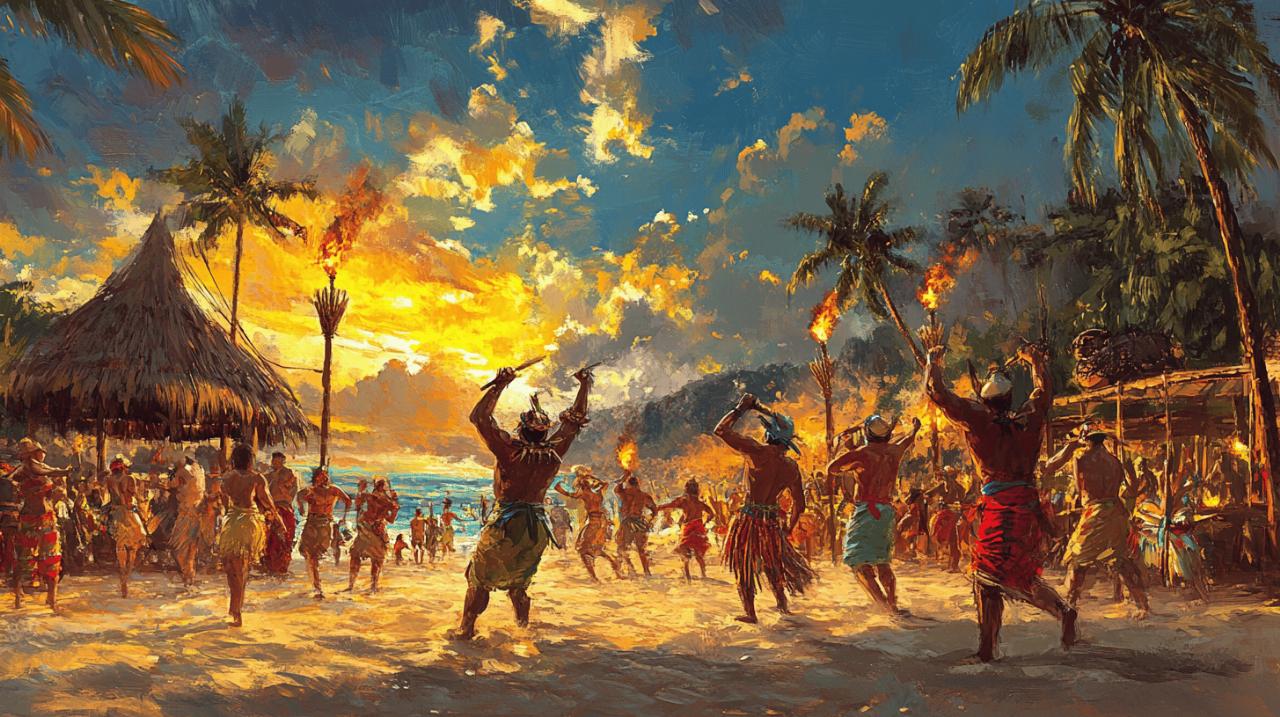Tropical destinations captivate travellers with their pristine beaches, crystal-clear waters, and abundant sunshine. However, beyond these idyllic natural landscapes lies a wealth of cultural treasures waiting to be discovered. The vibrant traditions, artistic expressions, and culinary practices found across tropical destinations offer visitors an enriching experience that extends far beyond sunbathing and water sports.
Artistic traditions in tropical societies
The artistic heritage of tropical regions reflects centuries of cultural evolution, often influenced by indigenous practices, colonial histories, and natural surroundings. From the elaborate handicrafts of Indonesian artisans to the rhythmic dances of Hawaiian performers, these creative expressions provide insights into local values and worldviews. Those who Travel Karibik or journey to other tropical regions often return home with not just photographs but also a deeper appreciation for these diverse cultural landscapes.
Colourful festivals and celebrations
Festivals serve as vibrant showcases of cultural identity across tropical destinations. In Zanzibar, Tanzania, known as the 'Spice Islands', local communities celebrate their heritage through music and dance festivals that highlight African and Arabic influences. Similarly, the islands of Fiji welcome visitors to participate in traditional ceremonies featuring rhythmic chants and kava-drinking rituals. The Hawaiian Islands host numerous celebrations throughout the year, each island contributing its unique cultural elements to festivities that honour ancient Polynesian traditions alongside contemporary expressions.
These celebrations often coincide with significant agricultural or seasonal events, creating a meaningful connection between cultural practices and the natural environment. In Vanuatu, named the 'Happiest Country in the World' in 2007, traditional ceremonies mark important life transitions and seasonal changes, offering tourists authentic glimpses into local customs that have survived for generations despite colonial influences.
Handicrafts and visual expression
Artistic craftsmanship flourishes across tropical destinations, with distinctive styles emerging from different regions. The Kuna people who manage the San Blas Islands of Panama are renowned for their molas, intricate textile art pieces featuring geometric designs and vibrant colours. In the Maldives, where overwater bungalows have become iconic accommodations, local artisans create beautiful lacquerware objects adorned with intricate patterns reflecting Islamic artistic traditions.
Visual expressions extend beyond souvenirs to include architectural styles that have evolved to suit tropical environments. The thatched-roof bungalows of French Polynesia, including the less touristy island of Moorea, represent practical adaptations to local climate conditions while creating aesthetically pleasing structures that complement their natural surroundings. Similarly, the Cook Islands feature traditional meeting houses with distinctive carved posts and beams that tell stories of ancestral connections.
Culinary delights from paradise
 Tropical cuisines offer a sensory journey through distinctive ingredients, cooking methods, and dining customs. Island gastronomy typically features abundant seafood, tropical fruits, and root vegetables prepared using techniques passed down through generations. The dining experience itself often emphasises communal sharing and connection to the environment, reflecting cultural values that prioritise hospitality and community bonds.
Tropical cuisines offer a sensory journey through distinctive ingredients, cooking methods, and dining customs. Island gastronomy typically features abundant seafood, tropical fruits, and root vegetables prepared using techniques passed down through generations. The dining experience itself often emphasises communal sharing and connection to the environment, reflecting cultural values that prioritise hospitality and community bonds.
Exotic ingredients and flavour profiles
The culinary landscape of tropical destinations showcases an impressive array of ingredients that thrive in warm climates. In Thailand's Koh Lipe, often called the 'Maldives of Thailand', visitors can sample aromatic curries featuring fresh coconut milk, lemongrass, and locally caught seafood. The diverse islands of St. Vincent & the Grenadines, which include 32 islands and cays, offer dishes incorporating breadfruit, callaloo, and flying fish prepared with distinctive Caribbean spice blends.
Spices feature prominently in many tropical cuisines, adding depth and complexity to dishes. Zanzibar earned its nickname as the 'Spice Islands' through its historical role in the spice trade, with cloves, cinnamon, and nutmeg grown locally and incorporated into aromatic rice dishes and stews. This culinary heritage connects visitors to the colonial history and trade networks that shaped these island cultures while delivering memorable flavour experiences.
Social significance of shared meals
Dining customs across tropical destinations reveal much about social structures and cultural values. In Palawan, Philippines, known for its stunning lagoons and limestone rock formations, meals often become extended family gatherings where multiple generations share food and conversation. The Nusa Lembongan area of Indonesia, popular for diving and surfing activities, maintains traditions of communal feasting during ceremonies where elaborate dishes symbolise prosperity and gratitude.
These shared dining experiences create opportunities for cultural exchange between locals and visitors. In the Whitsunday Islands of Australia, which include the famous Whitehaven Beach, tourists can participate in beachside seafood barbecues that blend Aboriginal cooking techniques with contemporary Australian culinary influences. Similarly, the relaxed atmosphere of Nicaragua's Corn Islands encourages visitors to join impromptu community gatherings where freshly caught seafood becomes the centrepiece of memorable social interactions.
Exploring tropical destinations means venturing beyond beautiful beaches and lagoons to discover rich cultural landscapes shaped by history, environment, and human creativity. Whether sampling exotic cuisine in New Caledonia with its world's second-largest reef, or admiring handcrafted textiles in remote island communities, travellers gain a deeper appreciation for these destinations by engaging with their vibrant cultural expressions. These experiences transform a tropical holiday from a simple escape to a meaningful journey of discovery and connection.
